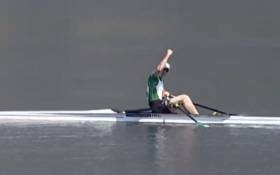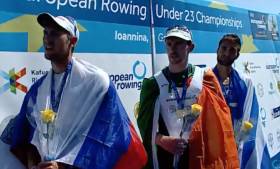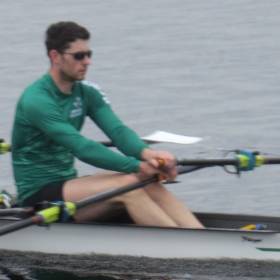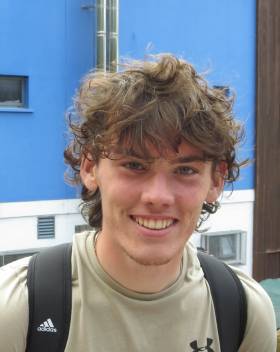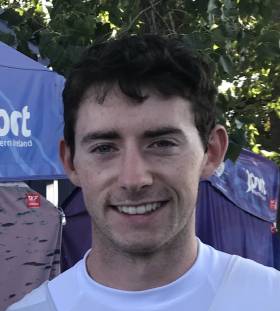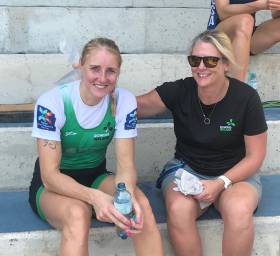Displaying items by tag: Ronan Byrne
Ireland Double Wins B Final at European Championships
On a day of promise for Ireland in A Finals of the European Rowing Championships, Ireland’s Philip Doyle and Ronan Byrne finished their campaign with a fine win in the B final of the double sculls.
Italy set the early pace in Varese, with Ireland and Germany closely tracking them through the middle and later stages. Doyle and Byrne produced a good sprint finish to win. This places them seventh overall.
The C Final was won by Norway’s Kris Brun and Are Strandli. The lightweight crew, which finished third at Rio 2016, campaigned in the open weight class at this event.
Daire Lynch finished his campaign in the single sculls quite well. He took a close-up second in the C Final behind impressive Russian sculler Nikolay Pimenov, who led down the course from the start. Lynch, who pushed hard at the end, places 14th overall at the Championships in a very tough event.
European Rowing Championships, Varese, Italy, Day Three (Irish interest)
Men
Double Sculls – B Final (Places 7 to 12): 1 Ireland (R Byrne, P Doyle) 6:21.47, 2 Italy 6:22.52, 3 Germany 6:23.29.
Single Sculls – C Final (Places 13 to 18): 1 Russia 7:08.08, 2 Ireland (D Lynch) 7:09.01.
Three Ireland Finalists for World Rowing Awards 2019
#Rowing: Ireland figure strongly in the finalists for the World Rowing Awards 2019. World champions Sanita Puspure, in the single sculls, and the lightweight double of Paul O’Donovan and Fintan McCarthy are finalists for women’s and men’s crews of the year. Ronan Byrne (21) is one of four finalists for the Filippi Spirit Award for outstanding university rower. Byrne won gold in the single sculls at the European Under-23 Championships just a week after partnering Philip Doyle to silver in the double sculls at the senior World Championships.
The award ceremony is on November 22nd in London.
Finalists for the 2019 World Rowing Awards
Thomas Keller Medal – for a rower who has had a long and successful rowing career and who has made an outstanding contribution to rowing as a competitor and as a sports personality.
- · Kim Brennan,Australia
- · Ekaterina Karsten,Belarus
- · James Cracknell,Great Britain
- · Pete Reed,Great Britain
- · Andrew Triggs Hodge,Great Britain
Filippi Spirit Award – for a university rower who has demonstrated the core values of rowing in his/her social, academic and sporting life and, through these values, also enabled or inspired exceptional success in other people's lives.
- · Ria Thompson,Australia
- · Jean Maillard,France
- · Ronan Byrne,Ireland
- · Nicholas Perovich,United States
World Rowing Sustainability Award – for an organisation that has implemented an innovative project or initiative delivering a clear and positive sustainability impact.
- · Spring Creek Regeneration Project,Australia
- · 2018 World Rowing Coastal Championships,Canada
- · Wintech: Clean air, water and solar power,China
- · Rowers Against Rubbish,Great Britain
- · Developing Environmental Ambassadors,Japan
World Rowing Para-rowing Crew of the Year
- · Kathryn Ross,Australia,Para PR2 Women’s Single Sculls
- · Ellen Buttrick, Giedre Rakauskaite, James Fox, Oliver Stanhope and Erin Wysocki-Jones (coxswain),Great Britain,Para PR3 Mixed Coxed Four
- · Lauren Rowles and Laurence Whiteley,Great Britain,Para PR2 Mixed Double Sculls
- · Birgit Skarstein,Norway,Para PR1 Women’s Single Sculls
- · Roman Polianskyi,Ukraine,Para PR1 Men’s Single Sculls
World Rowing Men’s Crew of the Year
- · Zhiyu Liu and Liang Zhang,China,Men’s Double Sculls
- · Valent Sinkovic and Martin Sinkovic,Croatia,Men’s Pair
- · Oliver Zeidler,Germany,Men’s Single Sculls
- · Paul O’Donovan and Fintan McCarthy,Ireland,Lightweight Men’s Double Sculls
- · Dirk Uittenbogaard, Abe Wiersma, Tone Wieten and Koen Metsmakers,The Netherlands,Men’s Quadruple Sculls
World Rowing Women’s Crew of the Year
- · Olympia Aldersey, Katrina Werry, Sarah Hawe and Lucy Stephan,Australia,Women’s Four
- · Yunxia Chen, Ling Zhang, Yang Lyu, Xiaotong Cui,China,Women’s Quadruple Sculls
- · Sanita Puspure,Ireland,Women’s Single Sculls
- · Zoe McBride and Jackie Kiddle,New Zealand,Lightweight Women’s Double Sculls
- · Grace Prendergast and Kerri Gowler,New Zealand,Women’s Pair
World Rowing Coach of the Year
- · Bernd Nennhaus,Germany,junior rowing crews
- · Tom Dyson,Great Britain,Para-rowing coach
- · Eelco Meenhorst,Netherlands,men’s sculling head coach
- · Gary Hay,New Zealand,women’s head coach
- · Johan Flodin,Norway,head coach
#Rowing: The Afloat Rower of the Month for September is Ronan Byrne. On Sunday, September 1st, the 21-year-old Corkman partnered Philip Doyle to silver in the double sculls at the senior World Championships in Linz-Ottensheim in Austria. He then set off for the European Under-23 Championships in Ioannina in Greece. He won gold there in the single sculls, overhauling imposing Russian sculler Alexander Vyazovkin in the final to win by over a length.
Byrne was the worldrowing.com Rising Star for September.
The month was also a special one for Ireland’s masters rowers. Crews drawn from Irish clubs, often in composites, set a new record of 16 medal wins at the World Masters Championships, held this year at Lake Velence in Hungary. Denis Crowley was a part of many of those wins – he put together an astounding tally of eight medals at this one event.
Monika Dukarska, who qualified the Ireland women’s pair for the Olympic Games at the World Championships, won gold for Killorglin in the single, the double and the coxed quadruple at the Irish Offshore Championships. Patrick Boomer won the men’s single for Loughros Point.
Byrne Adds Under-23 Gold to World Championship Silver Medal
#Rowing: Ronan Byrne won gold for Ireland at the European Under-23 Championships in Ioannina, Greece, this morning. He beat Russia’s Alexander Vyazovkin by four seconds in the single sculls final.
The Ireland women’s coxed four took fifth in their straight final, while Hugh Moore was fourth in his B Final of the lightweight single, 10th overall, and the double of Alex Byrne and Ross Corrigan took second in their C Final, 14th overall.
European Under-23 Championships, Ioannina, Greece, Day One (Selected Results; Irish interest)
Men
Double Sculls – C Final: 2 A Byrne, R Corrigan 6:43.69.
Single Sculls - A Final: 1 R Byrne 6:48.28.
Lightweight Single – B Final: 4 H Moore 7:30.07.
Women
Four, coxed - Final: 5 Ireland (C O’Brien, K Shirlow, L Murphy, N Casey; cox: A Humphries-Griffiths) 7:20.37.
Ronan Byrne In A Final at European Under-23 Championships
#Rowing: Ronan Byrne won his repechage and will compete in the A Final of the men’s single sculls at the European Under-23 Championships in Ioannina in Greece on Sunday. Lightweight single sculler Hugh Moore will compete in the B Final and the double of Ross Corrigan and Alex Byrne the C Final. Both crews placed fourth in their repechages.
European Under-23 Championships, Ioannina, Greece, Day One (Irish interest)
Men
Double Sculls – Heat One (First Three to A/B Semi-Finals; rest to Repechage): 4 Ireland (A Byrne, R Corrigan) 6:46.07. Repechage (First Three to A/B Semi-Finals; rest to C Final): 4 Byrne, Corrigan 6:50.42.
Single Sculls – Heat One (First to Final; rest to Repechage): 2 R Byrne 7:06.43. Repechage (First Two to A Final; rest to B Final: 1 Byrne 7:11.85
Lightweight Single – Heat One (First to Final; rest to Repechage): 5 H Moore 7:38.67. Repechage (First Two to A Final; rest to B Final): 4 Moore 7:21.09.
Women
Four, coxed – Exhibition/Race for Lanes: 3 Ireland 7:24.60
Ireland Crews Set For Repechages at European Under-23 Championships
#Rowing: Ireland’s first outings at the European Under-23 Championships in Ioannina, Greece, sent three of the four crews to repechages. Ronan Byrne, who took silver in the double sculls at the senior World Championships, needed to win his heat of the single, but finished second behind Stefanos Ntouskos of Greece. The men’s double and lightweight single will also have to compete in repechages to progress.
The women’s coxed four finished third in their five-boat race for lanes.
European Under-23 Championships, Ioannina, Greece, Day One (Irish interest)
Men
Double Sculls – Heat One (First Three to A/B Semi-Finals; rest to Repechage): 4 Ireland (A Byrne, R Corrigan) 6:46.07.
Single Sculls – Heat One (First to Final; rest to Repechage): 2 R Byrne 7:06.43.
Lightweight Single – Heat One (First to Final; rest to Repechage): 5 H Moore 7:38.67.
Women
Four, coxed – Exhibition/Race for Lanes: 3 Ireland 7:24.60
Puspure Wins Gold, Silver for Doyle and Byrne at World Rowing Championships
#Rowing: Sanita Puspure and the men's double scull of Philip Doyle and Ronan Byrne took gold and silver for Ireland on the final day of the World Rowing Championships in Linz-Ottensheim.
Puspure was set a very hard challenge by her friend and rival Emily Twigg of New Zealand, who led right through the middle of the race.
On a hot day, Puspure had to call on all her resources to catch and then pass Twigg. She did this in the final quarter, and then drove on to win well.
Ireland completed the set of gold, silver and bronze medals at the World Rowing Championships as Philip Doyle and Ronan Byrne raced a brilliant second half of their double sculls final to take silver. China were outstanding, while Ireland trailed early on but built their speed and passed all the other contenders. They were less than a boat length away from China, who took the gold.
In the run-up to Sunday, the lightweight double scull had taken gold and pararower Katie O'Brien bronze.
World Rowing Championships, Linz-Ottensheim, Day Eight (Irish interest)
Men
Double Sculls - A Final: 1 China 6:05.68, 2 Ireland (P Doyle, R Byrne) 6:06.25, 3 Poland 6:07.87.
Women
Single Sculls - A Final: 1 Ireland (S Puspure) 7:17.14, 2 New Zealand (E Twigg) 7:20.56, 3 3 United States (K Kohler) 7:22.21.
#Rowing: Ireland qualified a second boat for the Olympic Games today. The Ireland double of Philip Doyle and Ronan Byrne controlled their semi-final to win from Romania and Britain, who also qualified for the A Final.
The middle stages were superb. Ireland moved away from early leaders New Zealand and led Britain coming through the 1500 metres. From there came the charges of the other boats, but Doyle and Byrne repelled them all.
World Rowing Championships, Linz-Ottensheim, Day Six (Irish interest)
Men
Lightweight Quadruple - B Final: 1 United States 6:03.94, 2 Ireland (H Sutton, M Taylor, R Ballantine, J McCarthy) 6:06.62.
Double - A/B Semi-Final Two: 1 Ireland (P Doyle, R Byrne) 6:13.88, 2 Romania 6:14.86, 3 Britain 6:15.84.
Lightweight Single - B Final (places 7 to 12): 1 Austria (R Kepplinger) 7:00.16; 4 Ireland (G O'Donovan) 7:02.18.
Women
Lightweight Single - B Final (places 7 to 12): 1 Australia (Alice Arch) 7:52.59; 5 Ireland (L Heaphy) 7:55.40.
Doyle and Byrne Safely into Semi-Finals in Linz
#Rowing: Ireland qualified another boat for the semi-finals at the World Championships today as Philip Doyle and Ronan Byrne took second in their quarter-final of the double sculls. A top-three place was the aim: Germany, Poland and Ireland held these by the closing stages. Poland moved clear and Ireland left Germany behind them. Coming to the line, Ireland closed a little on Poland, but the winners held on and had 2.72 seconds to spare at the end.
World Rowing Championships, Linz-Ottensheim, Austria, Day Four (Irish interest)
Men
Double Sculls - Quarter-Final One - (First Three to A/B Semi-Finals; rest to C/D Semi-Finals): 1 Poland 6:15.06, 2 Ireland (P Doyle, R Byrne) 6:17.78, 3 Germany 6:21.04.
Lightweight Double Sculls - Quarter-Final Three - (First Three to A/B Semi-Finals; rest to C/D Semi-Finals): 1 Ireland (F McCarthy, P O'Donovan) 6:20.84, 2 Spain 6:22.84, 3 Poland 6:23.72.
Women
Pair - Quarter-Final Two (First Three to A/B Semi-Finals; rest to C/D Semi-Finals): 1 Australia 7:08.74, 2 Ireland (A Crowley, M Dukarska) 7:12.51, 3 Italy 7:13.11.
Lightweight Double Sculls - Quarter-Final Three - (First Three to A/B Semi-Finals; rest to C/D Semi-Finals): 4 Ireland (A Casey, D Walsh) 7:07.17.
Pararowing: Women's PR Two Single Sculls, Preliminary Race: 1 Australia (K Ross) 9:24.99; 3 Ireland (K O'Brien) 9:52.13.
Impressive Heat Win by Doyle and Byrne at World Championships
#Rowing: Philip Doyle and Ronan Byrne are in top form and showed it by winning their heat of the double sculls at the World Rowing Championships in Linz today. They started well, swapped the lead with Australia in the middle stages, then took it over again in the final quarter. Belarus managed to take the third qualification place for the quarter-finals despite catching a crab coming up to the line. Their bow crossed just ahead of the United States.
World Rowing Championships, Linz, Austria, Day One (Irish interest)
Men
Pair – Heat One (First Four to Quarter-Finals; rest to Repechage): 6 Ireland (M O’Donovan, S O’Driscoll) 6:50.51.
Double Sculls – Heat One (First Three to Quarter-Finals; rest to Repechage): 1 Ireland (P Doyle, R Byrne) 6:28.93.
Lightweight Double Sculls – Heat Three (First Three to Quarter-Finals; rest to Repechage): 1 Ireland (F McCarthy, P O’Donovan) 6:28.02
Lightweight Single Sculls – Heat Four (First Three to Quarter-Finals; rest to Repechage): 4 Ireland (G O’Donovan) 8:06.49.
Women
Four – Heat One (First Two to A/B Semi-Finals; rest to Repechage): 3 Ireland (T Hanlon, E Lambe, A Keogh, E Hegarty) 6:44.72.
Pair – Heat Four (First Four to Quarter-Finals; rest to Repechage): 2 Ireland (A Crowley, M Dukarska) 7:13.30
Lightweight Double Sculls – Heat Four (First Four to Quarter-Finals; rest to Repechage): 4 Ireland (A Casey, D Walsh) 7:25.62.
Lightweight Single Sculls – Heat Three (First Two to A/B Semi-Finals; rest to Repechage): 3 Ireland (L Heaphy) 8:01.79.



























